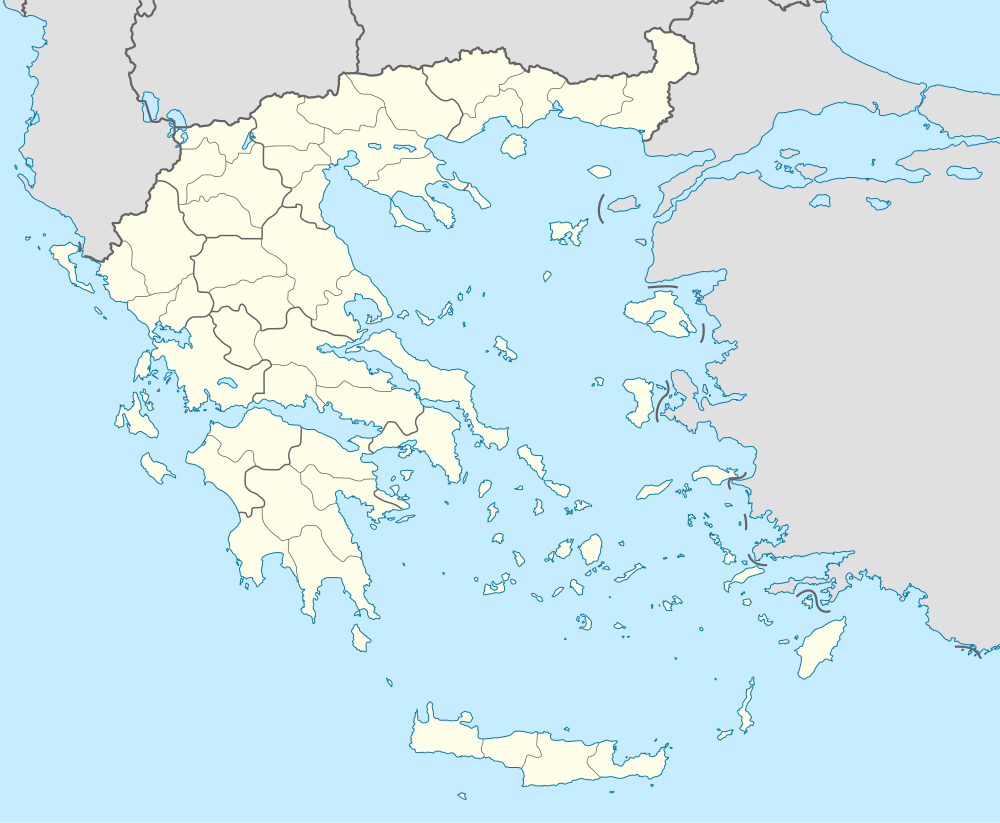Argyroupoli
| Argyroupoli Αργυρούπολη | |
|---|---|
|
The church of the Holy Trinity | |
 Argyroupoli | |
|
Location within Athens  | |
| Coordinates: 37°54′N 23°45′E / 37.900°N 23.750°ECoordinates: 37°54′N 23°45′E / 37.900°N 23.750°E | |
| Country | Greece |
| Administrative region | Attica |
| Regional unit | South Athens |
| Municipality | Elliniko-Argyroupoli |
| Districts | Ano and Kato Argyroupoli |
| • Municipal unit | 8.228 km2 (3.177 sq mi) |
| Elevation | 50 m (160 ft) |
| Population (2011)[1] | |
| • Municipal unit | 34,097 |
| • Municipal unit density | 4,100/km2 (11,000/sq mi) |
| Time zone | EET (UTC+2) |
| • Summer (DST) | EEST (UTC+3) |
| Postal code | 164 xx |
| Area code(s) | 210 |
| Vehicle registration | Z |
| Website | http://www.elliniko-argyroupoli.gr/ |
Argyroupoli (Greek: Αργυρούπολη) is a suburb in the southern part of the Athens agglomeration, Greece. Since the 2011 local government reform it is part of the Elliniko-Argyroupoli municipality, of which it is the seat and a municipal unit.[2]
Name
The city's name derives from the Greek words άργυρος (árgyros meaning silver) and πόλη (poli meaning city). The name's older form was Argyroupolis. The first name of the settlement was New Argyroupolis, given by the refugees from Gümüşhane.
History
As a part of the population exchange between Greece and Turkey after the Greco-Turkish war of 1919-1922, a number of refugees fled to Attica from the former Ottoman Empire. In 1926, refugees from Argyroupolis in northeastern Turkey (modern Gümüşhane meaning "silver house") arrived in site, then named Ktima Geroulanou (Greek: Κτήμα Γερουλανου). They named the new settlement Nea Argyroupolis as a remembrance to their old hometown. There was persumambly much resemblance between the two towns as, Argyroupoli is built on a plain with the Hymettus mountain to its north, as Gümüşhane is built on a plain with the Pontic Alps to the north. One of the first tasks of the settlers was to build the church of Αγία Βαρβάρα (St. Barbara), named after the patron saint of the now Turkish city.
During the Second World War, the settlement was used by the Germans to protect their ammunition and airplanes that were stationed in the nearby airfield. On December 6, 1943, the settlement was bombed by the RAF. Although there were reportedly no casualties amongst the population, the settlement was razed to the ground.
The settlement was part of the community of Kalamaki until 1949, when it became a separate community. It was elevated to municipality status in 1972.[3]
Geography
Argyroupoli is situated on the southwestern foot of the Hymettus mountain, 9 km (6 mi) south of Athens city centre. The municipality has an area of 8.228 km2.[4] It borders Ilioupoli municipality to the North, Alimos municipality and Elliniko municipal district to the West and Glyfada municipality to the South. The city is traversed by the Vouliagmenis Avenue, connecting downtown Athens with the southern suburbs. The three major shopping districts are Kyprou Avenue, M. Geroulanou Avenue and part of Vouliagmenis Avenue. Numerous public bus lines run through Argyroupoli connecting the city with Athens center and Glyfada. The subway stations that serve the suburb are Argyroupoli metro station and Alimos metro station.
Argyroupoli has a mild climate, affected by the sea and the mountain. It rarely snows, but rain is common. During summer, high temperatures are recorded.
Historical population
| Year | Population |
|---|---|
| 1971 | 13,956 |
| 1981 | 26,108 |
| 1991 | 31,530 |
| 2001 | 33,158 |
| 2011 | 34,097 |
International relations
Twin towns – Sister cities
Argyroupoli is twinned with:
 Castanet-Tolosan, France[5]
Castanet-Tolosan, France[5] Moncalieri, Italy[5]
Moncalieri, Italy[5]
Notable people
- Katerina Georgiadou, fashion model
- Ioannis Papazisis, actor
- Vanessa Adamopoulou, singer
- Kostas Tsakonas, actor
References
- ↑ "Απογραφή Πληθυσμού - Κατοικιών 2011. ΜΟΝΙΜΟΣ Πληθυσμός" (in Greek). Hellenic Statistical Authority.
- ↑ Kallikratis law Greece Ministry of Interior (Greek)
- ↑ EETAA local government changes Archived November 6, 2016, at the Wayback Machine.
- ↑ "Population & housing census 2001 (incl. area and average elevation)" (PDF) (in Greek). National Statistical Service of Greece.
- 1 2 "Twinnings" (PDF). Central Union of Municipalities & Communities of Greece. Retrieved 2016-04-08.
External links
- Municipal website (Greek)
- Video on Argyroupoli's history (Greek)
 |
Ilioupoli |  | ||
| Alimos | |
Kropia | ||
| ||||
| | ||||
| Elliniko | Glyfada |